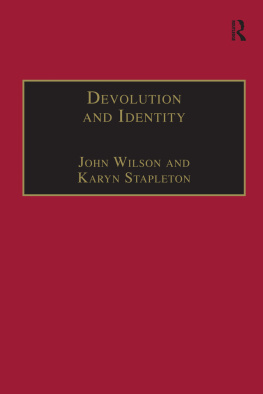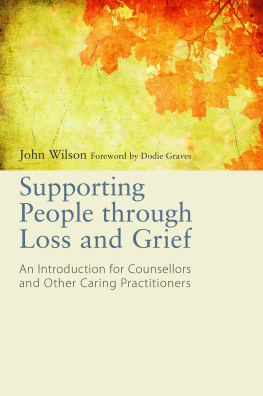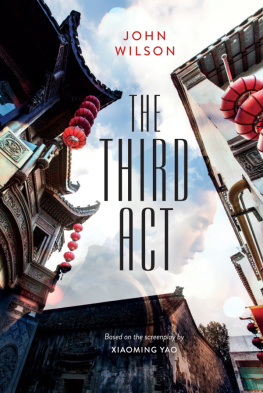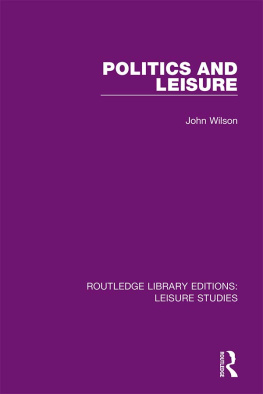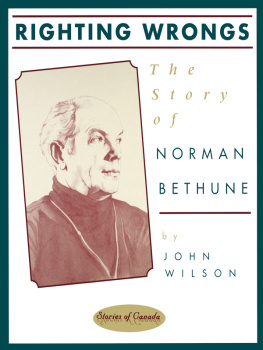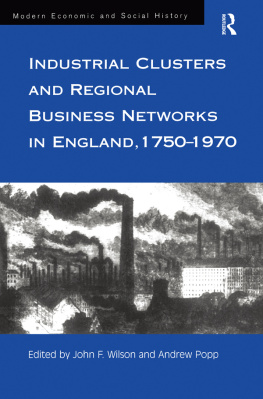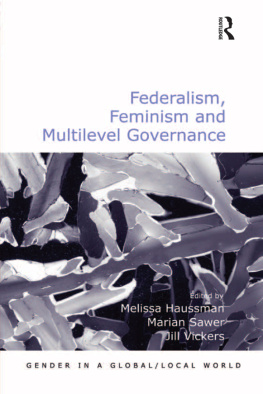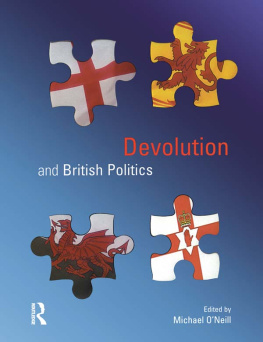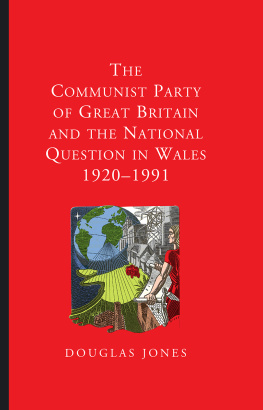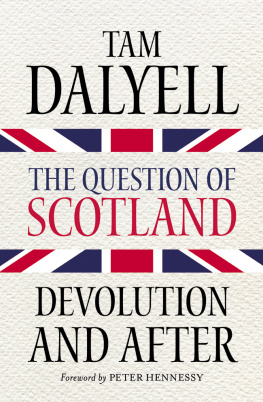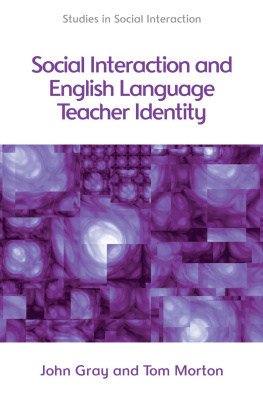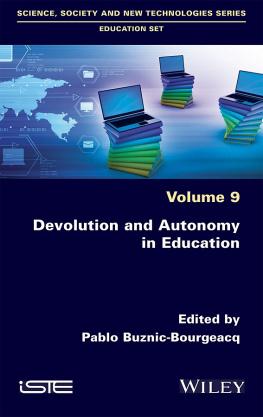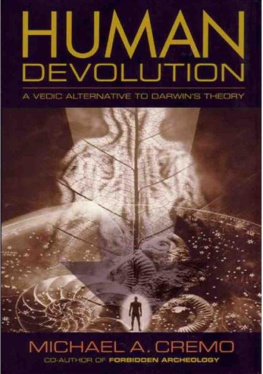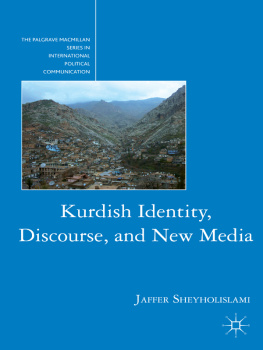Thanks to Linda and the girls.
Thanks to Fred, Mum, Ollie and Paddy.
First published 2006
by Ashgate Publishing
Published 2016
by Routledge
2 Park Square, Milton Park, Abingdon, Oxon, OX14 4RN
711 Third Avenue, New York, NY 10017, USA
Routledge is an imprint of the Taylor & Francis Group, an informa business
Copyright John Wilson and Karyn Stapleton 2006
John Wilson and Karyn Stapleton have asserted their right under the Copyright, Designs and Patents Act, 1988, to be identified as the editors of this work.
All rights reserved. No part of this book may be reprinted or reproduced or utilised in any form or by any electronic, mechanical, or other means, now known or hereafter invented, including photocopying and recording, or in any information storage or retrieval system, without permission in writing from the publishers.
Notice:
Product or corporate names may be trademarks or registered trademarks, and are used only for identification and explanation without intent to infringe.
British Library Cataloguing in Publication Data
Devolution and identity
1.Ethnicity - Great Britain 2.Decentralization in
government - Great Britain 3.Ethnicity - Northern Ireland
4.Unionism (Irish politics) 5.Nationalism - Wales
6.Nationalism - Scotland 7.Great Britain - Politics and
government - 1945- 8.Northern Ireland - Politics and
government 9.Wales - Politics and government 10.Scotland
Politics and government
I.Wilson, John II.Stapleton, Karyn
305.8'00941
Library of Congress Cataloging-in-Publication Data
Devolution and identity / edited by John Wilson and Karyn Stapleton.
p. cm.
Includes bibliographical references and index.
ISBN-13: 978-0-7546-4479-8
ISBN-10: 0-7546-4479-0
1. Regionalism--Great Britain. 2. Nationalism--Great Britain. 3. Decentralization
in government--Great Britain. 4. European Union--Great Britain. I. Wilson, John. II.
Stapleton, Karyn.
JN297.R44D48 2006
320.941--dc22
2006021136
ISBN 13: 978-0-7546-4479-8 (hbk)
Jackie Abell is a Social Psychologist at Lancaster University. Her current research interests include the examination of nationhood in political and media debates, the construction of local and national community and belonging, and football support.
Arthur Aughey is Professor of Politics at the University of Ulster. He has published widely on Northern Ireland politics, British Conservatism and constitutional change in the United Kingdom. Recent publications include Nationalism Devolution and the Challenge to the United Kingdom State and Northern Ireland Politics: After the Belfast Agreement . He has examined the diverse elements of the contemporary English Question in R. Hazell (ed.) The English Question and his own book The Politics of Englishness will be published by MUP in 2007. He is also writing jointly with John Oakland, a major text on Irish Civilisation , to be published in 2008.
Carol-Ann Barnes is a Doctoral Student at the University of Ulster. Her research interest lies in memory studies with specific reference to commemorative practice as a hybrid of professional history and popular memory. She is currently researching state sponsored commemorations in Northern Ireland in the early 1950s.
Hywel Bishop is Research Assistant on a 5-year programme on Language and Global Communication at Cardiff University, funded by the Leverhulme Trust. His research interests are in semiotics and discourse analysis, cultural theory, and media and political discourses, especially those relating to issues of migration, labour and resistance movements.
Dominic Bryan is Director of the Institute of Irish Studies at Queens University, Belfast, Chair of Democratic Dialogue, Irelands first Think-Tank, and has worked with the Northern Ireland Human Rights Commission and the Community Relations Council. Dominic is an anthropologist researching political rituals, public space and identity in Northern Ireland. His book Orange Parades: The Politics of Ritual Tradition and Control used theories of rituals to examine parades organised by the Orange Order in Ireland. Dominic also works on issues around public order policing, human rights, ethnic politics and sectarianism and has done comparative work in South Africa and the US.
Susan Condor is a Social Psychologist at Lancaster University. Her research focuses on everyday understandings of the social and political world. Specific interests include the role of historiography in constructions of social identity and political legitimacy; national consciousness and everyday political philosophy in England; and constructions of the public in political rhetoric.
Nikolas Coupland is Professor and Research Director of the Cardiff University Centre for Language and Communication Research. He co-edits the Journal of Sociolinguistics and the book series, Oxford Studies in Sociolinguistics . He is currently directing a 5-year project on Welsh Language and Welsh Identity under Globalisation as part of a larger programme funded by the Leverhulme Trust, titled Language and Global Communication.
Richard Fitzgerald gained his degree and PhD from Bangor University, and has lectured at Cardiff University and Brunel University. He is currently Lecturer in Communication and Language at the University of Queensland, Australia. He has published widely in the areas of media interaction; most notably radio discourse, and the application and development of the methodologies of Membership Categorisation Analysis, Conversation Analysis, and Discourse Analysis for exploring the organisation of cultural knowledge oriented to in talk.
William Housley is a Lecturer in Sociology at Cardiff School of Social Sciences and Deputy Director of the Research and Graduate School in the Social Sciences, Cardiff University. He has published numerous articles on interaction in organisations, political communication and cultural identity. He is the co-author (with Paul Atkinson) of Interactionism (2003) part of the BSA New Horizons in Sociology millenial series, co-editor (with Stephen Hester) of Language, Interaction and National Identity (2001) and author of Interaction in Multidisciplinary Teams (2002). He is currently working on the role of culture in the regeneration of post-industrial communities, citizen participation within post-devolution Wales and new frontiers in interactionist analysis and theory.

